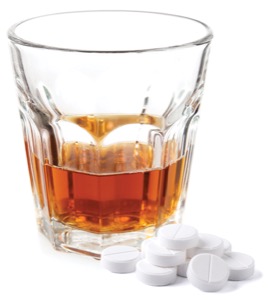Patients presenting for bariatric surgery may consume alcohol or use tobacco, marijuana or opioids. So, what do we know about how these substances affect the outcomes of bariatric surgery or how the surgery affects substance use? Experts discussed these issues at the 2021 annual meeting of the American Society for Metabolic and Bariatric Surgery (ASMBS).
Tobacco
Ivy Haskins, MD, an assistant professor of surgery at the University of Nebraska Medical Center, in Omaha, pointed out that smoking cessation is often a requirement for bariatric surgery at many medical centers or by insurance. Landmark articles have detailed the increased risk for early pulmonary and wound morbidity events in current smokers in both open and laparoscopic bariatric surgery, Dr. Haskins said. A recent systematic review describes the short- and long-term effects of smoking on bariatric surgery outcomes (Surg Endosc 2021;35[6]:3047-3066). In addition to early pulmonary and wound events, this review showed that active smokers also experience an increased rate of marginal ulcer formation and vitamin and mineral deficiencies. Guidelines from the American Association of Clinical Endocrinology, The Obesity Society and ASMBS state that tobacco use should be avoided at all times by all bariatric surgery patients (Surg Obes Relat Dis 2013;9[2]:159-191).
“Some studies have shown that patients who have had a longer period of time between smoking cessation and bariatric surgery are more likely to abstain from smoking over the long term, and perhaps requiring a longer period of smoking cessation preoperatively may decrease the likelihood of resuming smoking postoperatively,” Dr. Haskins said. She noted that a multimodal approach to smoking cessation works best, and clinicians should watch for addiction transfers, such as a patient quitting smoking and then becoming a sugar craver.

Although one in seven adults smoke cigarettes the year before undergoing weight loss surgery and nearly all successfully quit at least a month before their operation, smoking prevalence steadily climbs to presurgical levels within seven years after surgery (Ann Surg 2020 Feb 20. doi:1092SLA 0000000000003828). “There are likely many explanations for this observation, but one that I think that is worth highlighting is patient counseling,” Dr. Haskins said. “According to an American College of Surgeons statement, only 13% of general surgeons provide smoking cessation counseling to their patients. Additionally, many surgeons do not know the resources available to their patients either within their own hospital system or because of differences in insurance coverage for these types of programs. One program that may offer guidance is the Quit Smoking Before Surgery program, which is offered through the American College of Surgeons and has resources for both physicians and patients.”
Dr. Haskins said at the University of Nebraska Medical Center, smoking history is part of the bariatric intake process, and is discussed at every subsequent visit that occurs at the bariatric center. She said bupropion is often the first-line medication used to assist with smoking cessation. “When counseling bariatric surgery patients, it is important that they understand that smoking cessation is part of their lifelong lifestyle change, and that the success of their operation not only depends on the changes in their eating and exercise habits, but also on avoidance of smoking, which can negatively impact the long-term success of their surgery,” she said.
Marijuana
According to Allyson Diggins, PhD, an associate staff psychologist at the Cleveland Clinic Bariatric and Metabolic Institute, in Cleveland, between 6% and 8.3% of all individuals who are pursuing bariatric surgery endorse marijuana use. “There is a lot of debate about whether marijuana is a contraindication for bariatric surgery,” Dr. Diggins said. “When we look specifically at bariatric surgery, we see that studies have demonstrated an increased risk in two different areas: pain management as well as problematic eating behaviors.”
A study of 434 bariatric surgery patients found that 8.3% endorsed marijuana use. Those patients who endorsed marijuana use had significantly higher perioperative opioid requirements (natural log morphine equivalents of 3.92 vs. 3.52; P=0.0015) (Perm J 2018;22:18-002). Another study found that patients who used marijuana after surgery were more likely to have disordered eating (Surg Obes Relat Dis 2016;12[1]:171-178).
But there are no randomized trials examining whether marijuana is a contraindication for bariatric surgery. “In the studies that we do have, we see that there is no increased risk in short-term or 90-day complications [with marijuana]. There is no difference in weight loss at two weeks to three years after surgery. We also find that there is similar surgical site infections as well as similar 30-day readmissions and similar 30-day ED [emergency department] visits. Of note, in a lot of these studies, we don’t see the long-term effects of marijuana and what happens after that two-year point,” Dr. Diggins said.
Dr. Diggins said there is a dearth of research exploring marijuana use in bariatric surgery, and there are more questions than answers on this topic.
Alcohol
Scott Engel, PhD, the director of behavioral research at Sanford Health in Fargo, N.D., said it is well established that bariatric surgery increases the risk for alcohol disorders. In one study of 2,348 patients who underwent Roux-en-Y gastric bypass (RYGB) or laparoscopic adjustable gastric banding (LAGB), 20% of patients reported incident alcohol use disorder (AUD) symptoms within five years of undergoing RYGB, and undergoing RYGB versus LAGB was associated with twice the risk for incident AUD symptoms (Surg Obes Relat Dis 2017;13[8]:1392-1402). Numerous other studies highlight the risks for AUD after bariatric surgery (Obesity 2013;21[12]:2444-2451; JAMA Surg 2013;148[4]:374-377). “We find that after bariatric surgery, patients become much more intoxicated, and we see significant changes in the pharmacokinetics of alcohol after surgery,” Dr. Engel said.
According to the ASMBS, patients undergoing bariatric surgery should be screened and educated about AUD and bariatric surgery, and active AUD is a contraindication for weight loss surgery.
Opioids
According to Sanjeev Sockalingam, MD, a professor of psychiatry at the University of Toronto, and vice president, education and clinician scientist, at the Center for Addiction and Mental Health, and the director of the Bariatric Surgery Psychosocial Program, University Health Network, opioid use post-surgery is a concern and can lead to surgical and psychosocial sequelae. “In the U.S., 38 people die every day from overdoses involving overdoses of prescription opioids,” Dr. Sockalingam said. “We know that the initial prescription of opioids after surgery for pain management can lead to more persistent and continued use.”
In a study involving 56,183 bariatric surgery patients, preoperative opioid use was an independent risk factor for adverse events including severe complications (odds ratio [OR], 1.67), reoperation (OR, 1.87), length of stay (relative risk, 1.11) and readmission (OR, 1.70) (Surg Obes Relat Dis 2021;17[7]:1256-1262). Risk factors for continued or post-surgery initiated opioid use are more pain at baseline or less pain improvement, continued benzodiazepine use, subsequent bariatric procedures, improvement in mental health after surgery, and history of orthopedic surgery (Surg Obes Relat Dis 2017;13[8]:1337-1346). In a recent study involving 27,779 patients undergoing bariatric surgery, 21% had presurgical opioid use, and the rate of new persistent opioid use after bariatric surgery was 6.3% (Surg Endosc 2019;33[8]:2649-2656).
According to Traci Speed, MD, PhD, an assistant professor of psychiatry and behavioral sciences and the chief psychiatrist of the personalized pain program at the Johns Hopkins University School of Medicine, in Baltimore, patients undergoing bariatric surgery who are on chronic opioids have decreased quality of life, worse clinical outcomes, less weight loss, worse body image and a higher rate of depression.
“Broadly speaking, risk factors for opioid use disorder include individuals with a family history of substance use, less education or who are unemployed, certain personality traits such as impulsivity or being antisocial, having a mood disorder or anxiety disorder, as well as those with exposure to trauma or stress early on in life,” she said.
Dr. Speed said there is evidence that patients who have undergone bariatric surgery tend to get prescriptions of opioids in excess of what they actually use. An approach to minimizing opioid exposure during the perioperative period is to use collaborative care approaches, such as the enhanced recovery after surgery protocol, or ERAS.
“Those who receive higher doses and a greater duration of opioids are going to be at greater risk for developing a disorder. In the bariatric surgery population, we know that opioid-naive patients are at risk of developing persistent opioid use, and that is true for about 4% of the population. Those on preoperative opioids are at risk of continuing postoperative opioids, and that is true for 50% to 75% of the population.”


